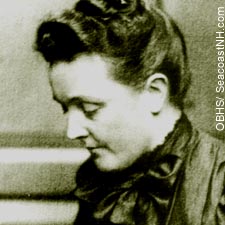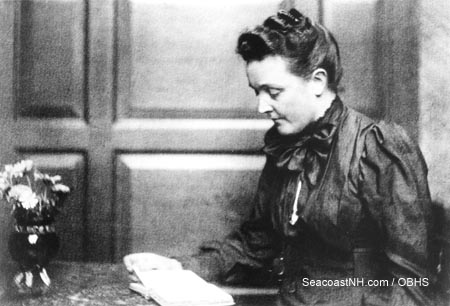| Sarah Orne Jewett of Maine |

SEACOAST LITERARY LIONS
She is quite possibly the finest writer the Piscataqua region has produced. Thousands of readers are discovering the life and work of Sarah Orne Jewett today and her home in South Berwick, Maine has been preserved just as it was when she lived there.
Sarah Orne Jewett
(1849- 1909)
Poet, short story writer and novelist
READ: All of Jewett's writing online
Even as a child, Sarah Orne Jewett felt a link to the past. Her paternal ancestors had helped found Rowley, Massachusetts. She could trace her lineage on her mother’s side of the family to early colonial times in Exeter, New Hampshire. Sarah’s grandfather, a wealthy merchant and sea captain, had connections to Portsmouth. She was born in South Berwick, Maine the second of three daughters of Dr. Theodore H. Jewett and Caroline Perry Jewett. At the time the family lived in her grandfather’s fine Georgian mansion, that still overlooks the crossing of the village’s two main streets.
Her education at the Berwick Academy nearby was intermittent because Sarah was often sickly. While excused from school she often accompanied her father, the prominent country doctor, on his daily rounds in his carriage. They had a close relationship. Under his guidance she learned to observe nature and the people they visited, and for whom she developed great empathy. Her book A Country Doctor is based on the life of Theodore Jewett.
While still quite young Sarah traveled with family and friends to New York and Philadelphia – indeed as far as Wisconsin one summer. So, from an early age, Sarah’s outlook was focused not only on South Berwick and its lovely rural surroundings, but also far beyond. These experiences of nature, local people and distant travel made a deep impression on her and would later resonate in her writing.
Sarah began writing as a young girl, first in her diary and by composing juvenile verses. At nineteen she published The Shipwrecked Buttons under the pseudonym of Alice C. Eliot. A month later, in December 1869, her story Mr. Bruce appeared in the prestigious Atlantic Monthly. The magazine’s editor William Dean Howells encouraged her to publish more short stories. They appeared as a collection under the title Deephaven in 1877. So, at age 28 Sarah Orne Jewett became known as one of New England’s leading writers and as such, joined the members of Boston’s literary elite.
CONTINUE with Sarah Orne Jewett profile
MAINE WOMAN AUTHORS (continued)

After Dr. Jewett died, a loss Sarah felt keenly, she continued to live with her mother, her older sister Mary, and her younger sister, Carrie, in the Jewett House. Carrie was the only one of the sisters to marry. Following Mrs. Jewett’s death, the sisters inherited the house and redecorated parts of it in the Arts and Crafts style, though they carefully preserved the maroon flocked paper in Mary’s room, which Sarah hated. Eventually Jewett house was given to the SPNEA, today "Historic New England," and today it appears to the visiting public just as it was when the sisters lived there.
Sarah always had close connections with Boston, where she often spent winters. She was first introduced to the Boston literary elite by James T. Fields, raised in Portsmouth. After his death Sarah became an intimate friend of the editor’s widow Annie Fields. In the 1880s and 1890s, Annie and Sarah traveled to England and Europe together. Over the years Sarah Jewett and Annie Fields consolidated their lifelong friendship and mutual support, sharing most everything in what is known as a "Boston marriage."
Sarah continued her writing, publishing short stories and novels almost every year. Her most acclaimed work, The Country of the Pointed Firs appeared in 1896 to great acclaim. Its publication was followed in 1901 with The Tory Lover, a historical novel that begins with a farewell dinner for John Paul Jones at Hamilton House. One must be a fan of Jones, of revolutionary history, the French connection, and of Hamilton House, to appreciate this fanciful tome today. But it was Jewett’s writing that attracted two women to restore the historic Hamilton House that, like Sarah’s home, has been preserved as a museum today.
Jewett’s legacy is secure. In 1901 she was the first woman to receive a doctorate in literature from Bowdoin College. But she has also been criticized because her work neglected to mention the social and industrial changes evident in South Berwick and elsewhere. The Irish immigrant workers who populated the mills and worked as household help appear rarely and only in her late stories.
Sarah Orne Jewett was injured in a riding accident in 1902 from which she never fully recovered. In the ensuing years she continued to write only the occasional short story, but never neglected letter writing to her many friends. In 1908 she met Willa Cather and began a correspondence with her. In one of her last letters Sarah praised Cather’s latest story for its "finely drawn characters and tender insights." Their friendship was brief and intense, the relationship of a mentor to an aspiring young writer. Sarah Orne Jewett died in September 1909 in South Berwick. Annie Fields, survived her by six years and wrote a loving reminiscence of her.
(c) 2006 Ursual Wright on SeacoastNH.com. All rights reserved.
OUTSIDE LINKS
Jewett House and Hamilton House web site
Old Berwick Historical Society web site
Berwick Academy web site
